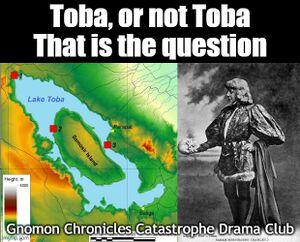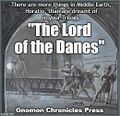Toba, or not Toba: Difference between revisions
Jump to navigation
Jump to search
(Created page with "thumb|"'''Toba, or not Toba'''"."'''Toba, or not Toba'''" is the opening phrase of a soliloquy given by Prince Hamlet in the so-called "geology...") |
No edit summary |
||
| (5 intermediate revisions by the same user not shown) | |||
| Line 1: | Line 1: | ||
[[File:Toba, or not Toba.jpg|thumb|"'''Toba, or not Toba'''".]]"'''Toba, or not Toba'''" is the opening phrase of a soliloquy given by Prince Hamlet in the so-called "geology scene" of William Shakespeare's play ''Hamlet'', Act 3, Scene 1. | [[File:Toba, or not Toba.jpg|thumb|"'''Toba, or not Toba'''".]]"'''Toba, or not Toba'''" is the opening phrase of a soliloquy given by Prince Hamlet in the so-called "geology scene" of William Shakespeare's play ''Hamlet, Prince of Geologists'', Act 3, Scene 1. | ||
In the speech, Hamlet contemplates death and catastrophe, bemoaning the pain and unfairness of the Toba supervolcano but acknowledging that the catastrophe theory might be overstated. | In the speech, Hamlet contemplates death and catastrophe, bemoaning the pain and unfairness of the Toba supervolcano but acknowledging that the catastrophe theory might be overstated. | ||
| Line 6: | Line 6: | ||
<gallery> | <gallery> | ||
File:Peak drainage basin.jpg|link=Peak drainage basin|'''[[Peak drainage basin]]''' is the moment at which erosion of drainage basins reaches a rate greater than that at any time in the past and starts to decrease. | |||
File:The Lord of the Danes.jpg|link=The Lord of the Danes|'''''[[The Lord of the Danes]]''''' is an epic Shakespearean play about a prince of Gondor (Hamlet) whose attempts to exorcise the ghost of his father lead to madness, betrayal, and murder. | |||
</gallery> | </gallery> | ||
| Line 13: | Line 17: | ||
* [[Gnomon algorithm]] | * [[Gnomon algorithm]] | ||
* [[Gnomon Chronicles]] | * [[Gnomon Chronicles]] | ||
* [[Peak drainage basin]] | |||
* ''[[The Lord of the Danes]]'' | |||
== Nonfiction cross-reference == | == Nonfiction cross-reference == | ||
== External links == | == External links == | ||
* [https://twitter.com/GnomonChronicl1/status/1470394933735477252 Post] @ Twitter (13 December 2021) | |||
* [https://en.wikipedia.org/wiki/Toba_catastrophe_theory Toba catastrophe theory] @ Wikipedia | * [https://en.wikipedia.org/wiki/Toba_catastrophe_theory Toba catastrophe theory] @ Wikipedia | ||
* [https://en.wikipedia.org/wiki/To_be,_or_not_to_be To be, or not to be] @ Wikipedia | * [https://en.wikipedia.org/wiki/To_be,_or_not_to_be To be, or not to be] @ Wikipedia | ||
[[Category:Fiction (nonfiction)]] | [[Category:Fiction (nonfiction)]] | ||
| Line 26: | Line 35: | ||
[[Category:Hamlet (nonfiction)]] | [[Category:Hamlet (nonfiction)]] | ||
[[Category:Shakespeare (nonfiction)]] | [[Category:Shakespeare (nonfiction)]] | ||
[[Category:Toba catastrophe theory (nonfiction)]] | |||
[[Category:Volanoes (nonfiction)]] | [[Category:Volanoes (nonfiction)]] | ||
[[Category:Crimes against geological constants]] | [[Category:Crimes against geological constants]] | ||
Latest revision as of 07:16, 7 February 2024
"Toba, or not Toba" is the opening phrase of a soliloquy given by Prince Hamlet in the so-called "geology scene" of William Shakespeare's play Hamlet, Prince of Geologists, Act 3, Scene 1.
In the speech, Hamlet contemplates death and catastrophe, bemoaning the pain and unfairness of the Toba supervolcano but acknowledging that the catastrophe theory might be overstated.
In the News
Peak drainage basin is the moment at which erosion of drainage basins reaches a rate greater than that at any time in the past and starts to decrease.
The Lord of the Danes is an epic Shakespearean play about a prince of Gondor (Hamlet) whose attempts to exorcise the ghost of his father lead to madness, betrayal, and murder.
Fiction cross-reference
- Crimes against geological constants
- Gnomon algorithm
- Gnomon Chronicles
- Peak drainage basin
- The Lord of the Danes
Nonfiction cross-reference
External links
- Post @ Twitter (13 December 2021)
- Toba catastrophe theory @ Wikipedia
- To be, or not to be @ Wikipedia


